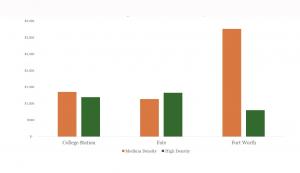
New Study Finds Increasing Housing Density Pays Off for Texas Cities
Texas 2036 and UT Austin partner on fiscal analysis of residential development.
AUSTIN, TX, UNITED STATES, May 8, 2025 /EINPresswire.com/ -- A new report released today by Texas 2036 and the Center for Sustainable Development at the University of Texas at Austin School of Architecture reveals that higher density residential development—think townhomes, garden apartments, and small multifamily buildings—can generate tens of thousands of dollars more net revenue for Texas cities than traditional suburban subdivisions.
The study analyzes nine recently completed housing developments in Fort Worth, College Station, and Fate.
It finds that in most cases, medium- and high-density developments create more revenue for cities through property taxes than they cost to serve, especially when compared to the significant long-term costs of maintaining roads, water, and sewer infrastructure for low-density subdivisions. In some cases, denser developments were more than $3,000 more fiscally productive per housing unit.
As Texas adds more than 1,500 new residents per day, city leaders across the state are under pressure to build housing without negatively impacting their budgets over the long run. This study offers a roadmap for how denser housing can help communities grow affordably and sustainably. The findings come at a time when state legislators are debating reforms to address housing affordability issues across Texas.
“Texas cities are growing fast, and every new development comes with both opportunities and obligations,” said Dr. Jake Wegmann, associate professor at UT Austin School of Architecture and lead author of the study. “Our analysis shows that when cities choose compact growth, they’re not just making more room for residents—they’re also making more room in their budgets.”
In all three cities, the study found that denser developments outperformed low-density housing developments when measured by fiscal productivity per housing unit.
“Texas communities are navigating tough choices about growth, affordability, and infrastructure,” said Emily Dove, policy advisor at Texas 2036. “This study equips local leaders with real-world data on the financial consequences of their land use decisions. That’s the kind of insight Texas needs to grow responsibly.”
The study also found that the cost of maintaining and eventually replacing local roads and underground infrastructure can consume more than 60% of the added fiscal burden in low-density developments. Denser developments, on the other hand, often require fewer new roads or none at all, delivering long-term savings.
The report’s findings are based on a transparent, replicable fiscal impact model available for download at www.texas2036.org/housing, giving cities and planners across the state a useful tool to inform local development policies. This research was made possible by support from Wells Fargo and Texas REALTORS®.
####
About Texas 2036
Texas 2036 is a nonprofit public policy organization committed to building long-term, data-driven strategies to ensure Texas’ prosperity up to its bicentennial and beyond. Our solutions are nonpartisan, grounded in thorough research and focus on critical issues that seek to improve lives and opportunities for all Texans.
About The University of Texas at Austin | School of Architecture
The University of Texas at Austin School of Architecture has a long-standing legacy of leadership in next-generation design and planning education. Offering degrees in architecture, architectural history, community and regional planning, historic preservation, interior design, landscape architecture, sustainable design, and urban design, the school melds principles and practices to foster innovation and serve communities. Its award-winning faculty brings expertise across systems, technology, sustainability, Latin American architecture, and urbanism, while research units—the Center for Sustainable Development and the Center for American Architecture and Design—advance impactful scholarship and community-engaged work.
Media Contacts:
John Reynolds
Director of Communications, Texas 2036
Ph: 512-468-7003 | Email: john.reynolds@texas2036.org
Anna Bowers
Communications Coordinator, The University of Texas at Austin | School of Architecture
Ph: 512-471-0154 | Email: anna.bowers@austin.utexas.edu
Merrill Davis
Texas 2036
+1 713-213-7297
email us here
Distribution channels: Agriculture, Farming & Forestry Industry, Banking, Finance & Investment Industry, Business & Economy, Real Estate & Property Management, U.S. Politics
Legal Disclaimer:
EIN Presswire provides this news content "as is" without warranty of any kind. We do not accept any responsibility or liability for the accuracy, content, images, videos, licenses, completeness, legality, or reliability of the information contained in this article. If you have any complaints or copyright issues related to this article, kindly contact the author above.
Submit your press release

